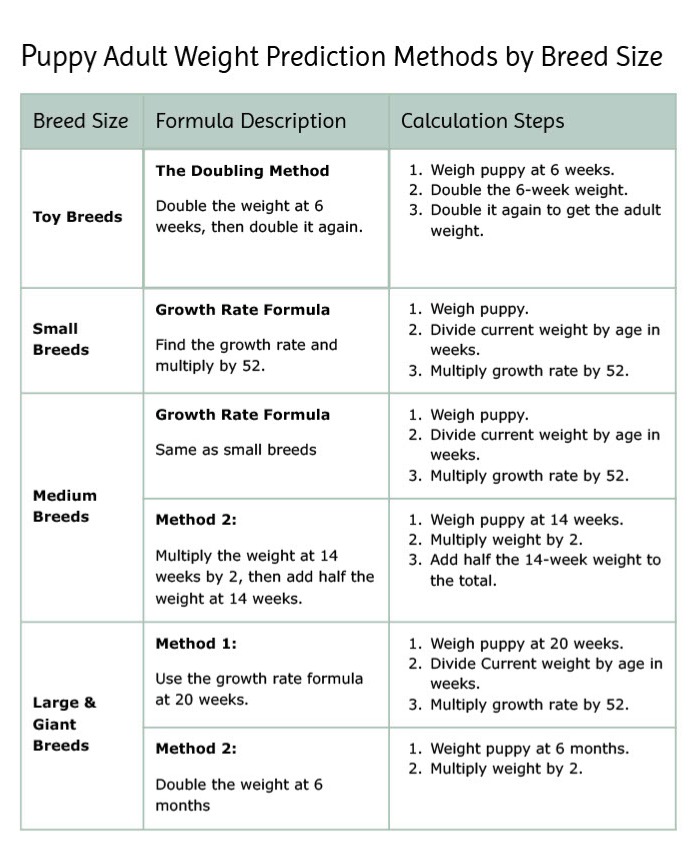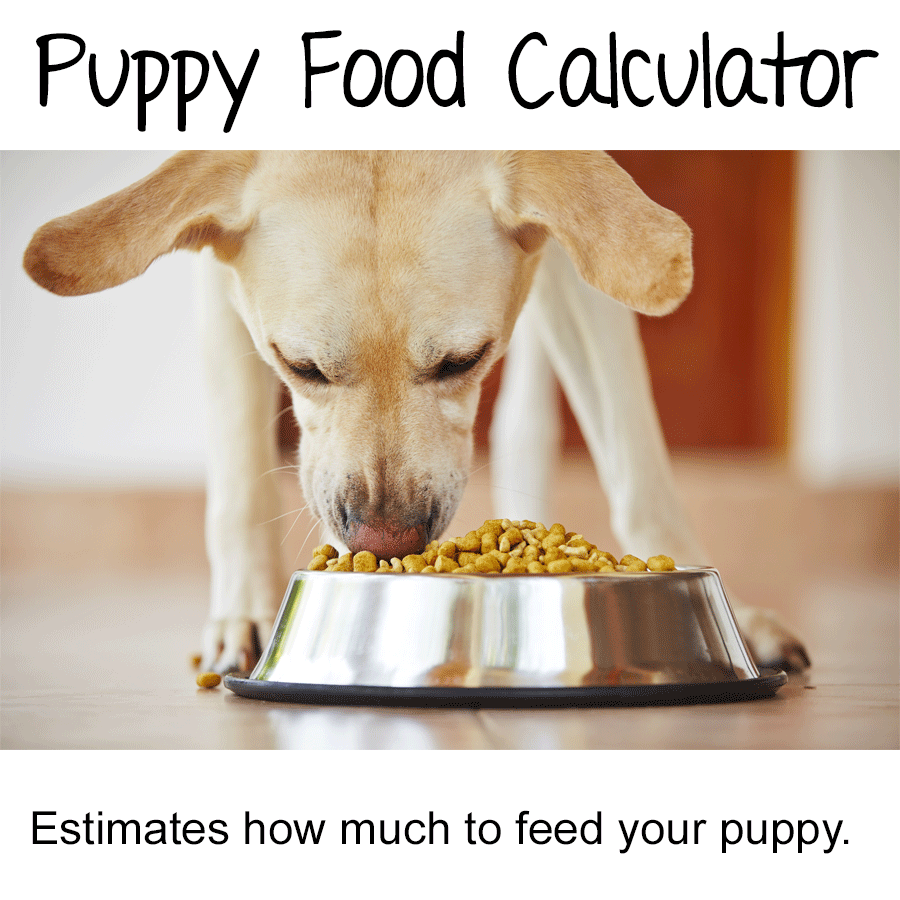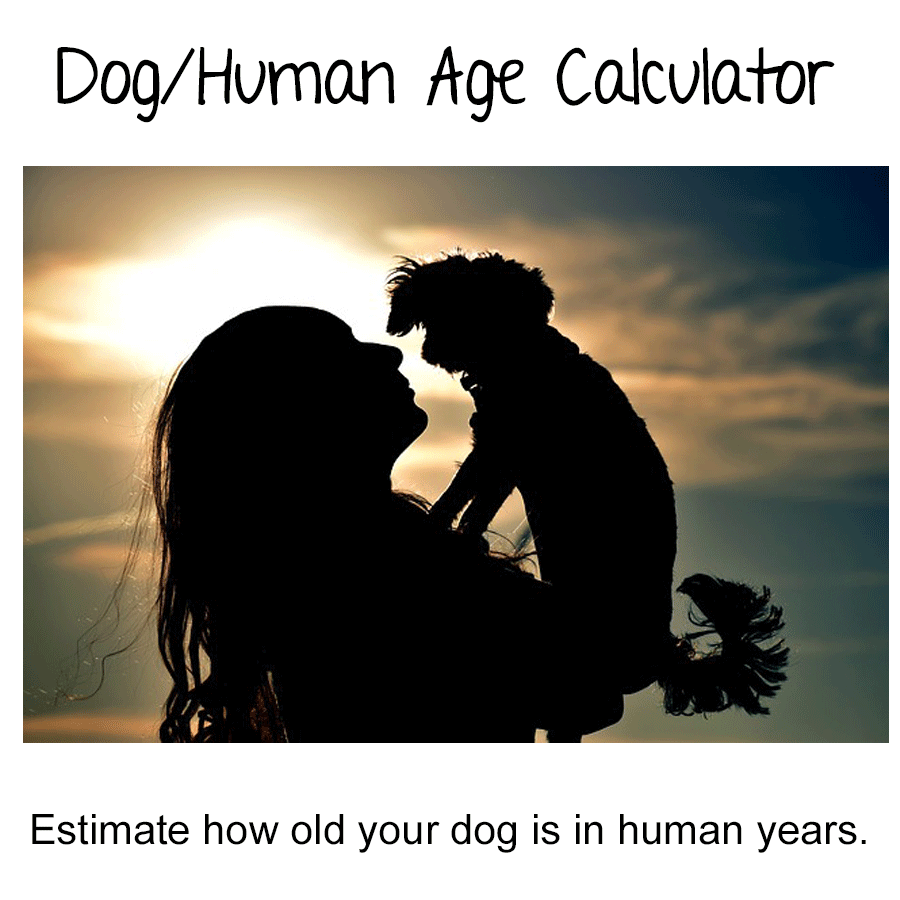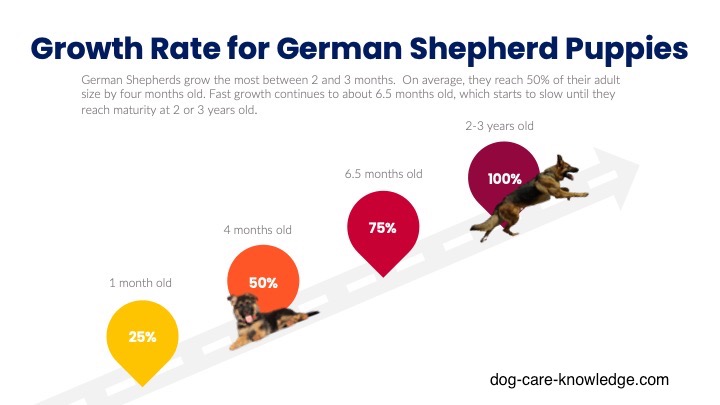- Home
- Dog Weights
- Puppy Weight Calculator
Puppy Weight Calculator:
Discover Your Puppy's Future Size: Accurate Predictions Made Easy
Why use a puppy weight calculator? The simple answer is to predict how much your cute little puppy may weigh as an adult dog. Apart from the fact that it'll help you plan and prepare better, aren't you just a little bit curious of how big the little guy's gonna get?
Knowing the breed helps with what to expect (roughly), but there is so much variation in size, and factors involved, it's hard to tell sometimes, especially if it's a mix-breed.
Then you may be entirely in the dark.
All puppies grow at different rates; however, breed size is a reliable indicator of how much weight they'll gain and how quickly.
Our interactive tool uses the growth rate for each breed size to estimate the adult weight. The growth rate is how much weight your puppy gains in one week on average. It is calculated by dividing his current weight by his age in weeks.
Growth rate = current weight divided by age in weeks.
For example, if you have a puppy that weighs 4 lbs at 14 weeks old, the growth rate would be 4 ÷ 14 = 0.29. Which means this puppy gains 0.29 lbs on average each week.
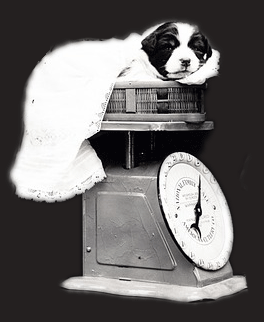
Breed Size Categories
Typically, dog breeds are split into five categories by size: toy, small, medium, large, and giant. It's not an exact science, and many breeds will have some overlap.
Breed Size |
Weightup to 12 lbs |
Maturity Age9 - 12 Months |
If you have a mix-breed dog or if you're not sure which breed size category your puppy falls into, check your puppy's current age and weight against our puppy weight charts.
4 Steps to Using the Puppy Weight Calculator Interactive Tool
- Enter current age in weeks (1 - 52)
- Enter your pup's current weight in lbs
- Choose the appropriate breed size
- The predicted adult weight will appear on the screen
If you have a mix-breed dog, see our puppy weight charts to see which breed category your puppy falls into based on his current weight and age.
Puppy Weight Calculator
What is your puppy's age in weeks?
weeksWhat is your puppy's current weight (lbs)?
poundsWhat is your puppy's size?
Toy (less than 12lbs at adult weight)

Toy (less than 12lbs at adult weight)
Small (12lbs - 25lbs at adult weight)
Medium (25lbs - 50lbs at adult weight)
Large (50lbs - 100lbs at adult weight)
Giant (Over 100lbs at adult weight)
Puppy Weight Estimator Formulas
I hope you found the calculator helpful, bear in mind these are only estimations. No tool can predict exactly how big your puppy will be. But they are fun to try and they'll give you a good idea of what size to expect.
Another way to predict your puppy's adult weight, if you don't mind a little math, is to use a formula. This is actually peeking behind the curtain of all puppy weight calculators. They are all based on at least one of the formulas below which you can copy and do the math yourself.
Example Calculations
I've included some examples of how to use the formulas so you can see how they're used. Heck, if you do them all, along with using the calculator and charts, and take the average of all the results.
Toy Breed - Doubling Method
Double the weight at 6 weeks, then double it again.
- Weight at 6 weeks: 2 lbs
- Double at 6 weeks: 2 × 2 = 4 lbs
- Double again: 4 × 2 = 8 lbs
- Estimated Adult Weight: 8 lbs

Small
Breed (Growth Formula Method)
Reminder: Growth rate = current weight divided by age in weeks.
Find the growth rate and multiply by 52.
- Current weight: 4 lbs
- Age: 14 weeks
- Growth rate: 4 ÷ 14 = 0.29 lbs per week
- Multiply by 52: 0.29 × 52 = 15.08 lbs
- Estimated Adult Weight: 15.08 lbs
Medium
Breed (Method 2)
Multiply the weight at 14 weeks by 2, then add half the weight at 14 weeks.
- Weight at 14 weeks: 10 lbs
- Double: 10 × 2 = 20 lbs
- Add half the 14-week weight: 20 + (10 ÷2) = 20 + 5 = 25 lbs
- Estimated Adult Weight: 25 lbs

Large & Giant Breed (Method 1)
Use the growth rate formula when your puppy is 20 weeks (4.6 months) old and multiply by 52.
- Current weight: 45 lbs
- Age: 20 weeks
- Growth rate: 45 ÷ 20 = 2.25 lbs per week
- Multiply by 52: 2.25 × 52 = 117 lbs
- Estimated Adult Weight: 117 lbs

Large & Giant Breed (Method 2)
Double the weight at 6 months.
- Weight at 6 months: 39 lbs
- Double: 39 × 2 = 78 lbs
- Estimated Adult Weight: 78 lbs
Other Factors That Affect Growth
Just as there are many different ways to predict your pup's weight, so too are there factors that influence it. Puppies all grow at different rates, even in the same litter. Here are the main ones to take into account.
Genetics
Without a doubt, genetics is the most influential factor that affects your puppy's growth. A puppy will inherit a lot of traits from their parents including weight and build.
When I had my puppy, Hudson, I stayed in contact with his breeder . Hudson's parents were "show line" dogs so it was common for his breeder to compete locally with Hudson's parents and relatives. I took Hudson to socialize at the shows and met a lot of Hudson's relatives, as well as adult dogs from past litters she'd bred.
It gave me a solid idea of what Hudson's size would be and a great opportunity for me to ask lots of questions. Dedicated breeders love to talk about their puppies, past and present and their information is gold.
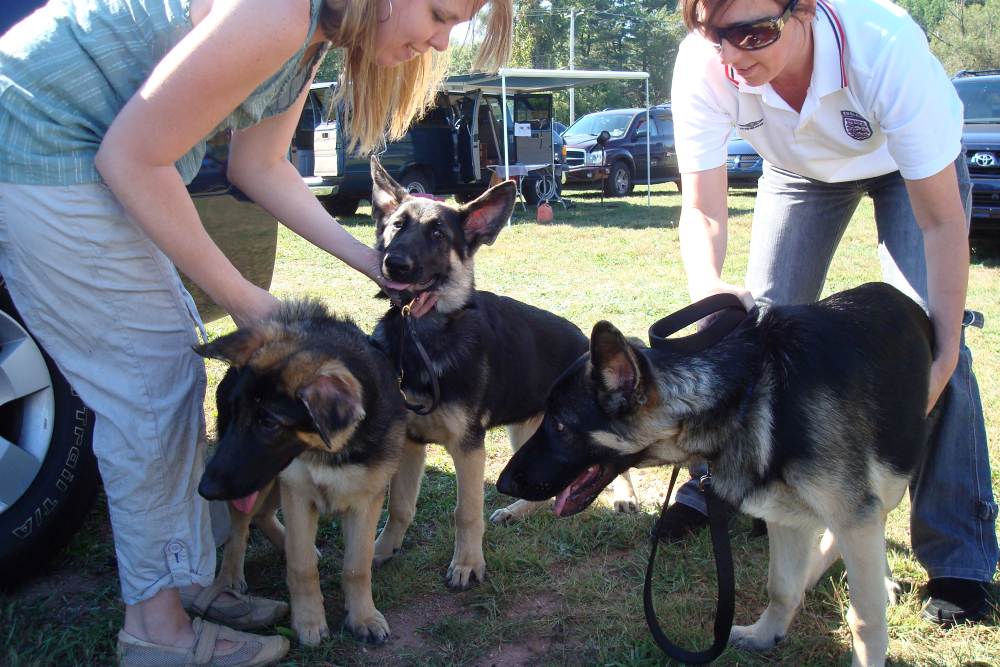 Hudson meeting his littermates at a dog show - it wasn't easy to get them to sit still and pose.
Hudson meeting his littermates at a dog show - it wasn't easy to get them to sit still and pose.Nutrition
There are "puppy formulated foods" for a reason. A puppy has specific nutritional needs to support their growing little bodies. They need a balanced diet that is rich in protein, fats, vitamins and minerals. Giving them the wrong foods, or not enough of the right food, may impact their growth.
Impact of Neutering/Spaying on Your Puppy's Growth, Weight and Size
Research suggests that neutered or spayed dogs tend to be slightly larger than their intact counterparts because the removal of sex hormones may delay the closure of the growth plates in the bones. This delay could cause a puppy to grow taller than they would if they were not spayed or neutered.
The impact on weight can also be significant, as altered pets are more prone to weight gain. The metabolism of dogs can slow down after being spayed or neutered, leading to a reduced need for calories. If your puppy continues to consume the same amount of food, it can result in weight gain and obesity.
Exercise
Getting an appropriate amount of exercise will help keep your puppy healthy and maintain a good weight. Having said that, you need to be extra careful that you don't overdo it with young pups. Too much high impact exercise is not good for their developing bones and joints.
That means no jumping until their bones and joints are fully mature. Think gentle on-leash walks and puppy socialization and training. The key is a balance amount of physical exercise which will help them develop strong muscles and bones.

Dealing with Underweight or Overweight Puppies
The weight of your puppy can be a good indicator of their overall health. A puppy's weight can depend on various factors including breed, diet, activity level, and potential health problems. Knowing what to do if your puppy is underweight or overweight can help ensure their healthy development and well-being.
If your puppy is underweight, first verify this against a breed-specific growth chart or use the puppy weight calculator above, as different breeds have different growth rates and healthy weight ranges.
If your pup is underweight, it may be due to insufficient calorie intake, poor diet quality, or a health problem. Consult your vet and consider a diet change to a high-quality puppy food that provides the necessary nutrients for growth.
An overweight puppy may be consuming too many calories or not getting enough exercise. Overweight puppies can develop health problems, and excess weight can stress their developing bones and joints.
Consult your vet if you suspect your puppy is overweight. They may recommend a diet change or creating a plan to increase your puppy's activity level.
In either case, report any sudden weight changes to your vet as it could indicate a serious health issue. Lastly, maintaining regular vet check-ups will help monitor your puppy's growth and weight, ensuring they stay within healthy ranges.

To Sum Up
Knowing a puppy's potential adult weight helps you plan and prepare for the future. This is particularly important if you are a prospective puppy parent.
Our Puppy Weight Calculator provides an easy-to-use, interactive tool that estimates your puppy's future size based on their breed and current growth rate. Remember, while these predictions can be helpful, they are only estimates.
Each puppy is unique, and various factors such as genetics, nutrition, and health can influence their growth. By considering these factors, using the calculator, and trying the formulas, you can better understand how big your cute fluffball may be.
Additional Resources
If you prefer a more visual approach, check out our puppy weight chart pages. These tools provide quick and easy insights into your puppy’s growth.
Like the Puppy Weight Calculator?
You might like these too!
Reference/source:
Hawthorne, A. J., Booles, D., Nugent, P. A., Gettinby, G., & Wilkinson, J. (2004). Body-Weight Changes during Growth in Puppies of Different Breeds. The Journal of Nutrition,134(8), 2027S-2030S. doi:10.1093/jn/134.8.2027s
Hart BL, Hart LA, Thigpen AP, Willits NH. Long-term health effects of neutering dogs: comparison of Labrador Retrievers with Golden Retrievers. PLoS One. 2014 Jul 14;9(7):e102241. doi: 10.1371/journal.pone.0102241. PMID: 25020045; PMCID: PMC4096726.. https://www.ncbi.nlm.nih.gov/pmc/articles/PMC4096726/

